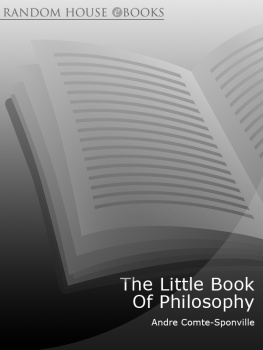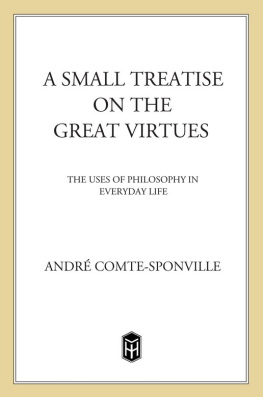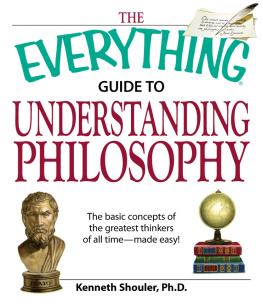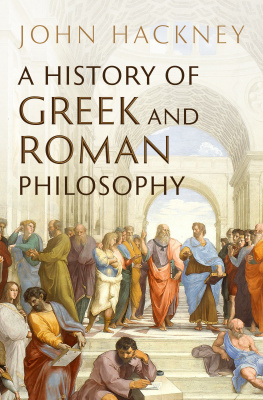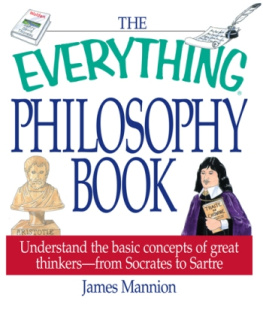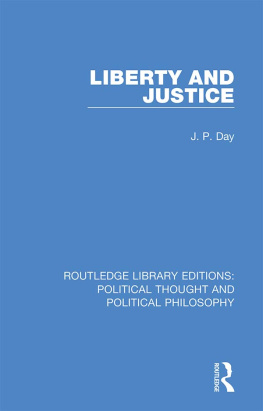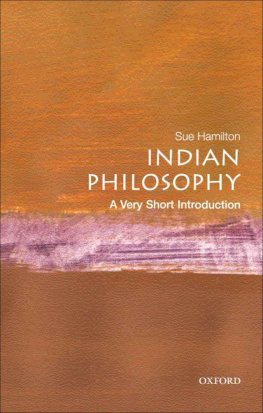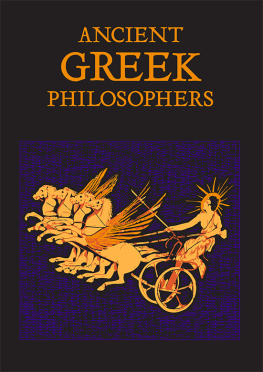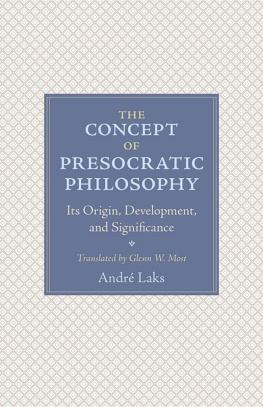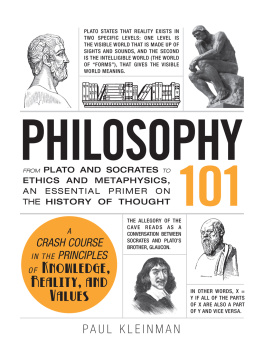Contents
About the Author
Andr Comte-Sponville is professor of philosophy at the Sorbonne and the author of five scholarly works on classical philosophy. He is also the author of the international bestseller A Short Treatise on the Great Virtues, which has been translated into twenty-four languages.
ALSO BY ANDR COMTE-SPONVILLE
A Short Treatise on the Great Virtues
For Christian Recchia
Andr Comte-Sponville
T HE L ITTLE B OOK
OF P HILOSOPHY
TRANSLATED FROM THE FRENCH BY
Frank Wynne

Htons-nous de rendre la philosophie populaire!
Let us hasten to make philosophy popular!
Diderot
Foreword
Philosophy: the doctrine and exercise of wisdom (not simply science)
Kant
TO PHILOSOPHISE IS to think for oneself; but no one can truly do so without drawing on the thoughts of others, especially those of the great philosophers of the past. Philosophy is not simply an adventure; it is also a task which cannot be accomplished without effort, without reading, without tools. As often as not the first steps are off-putting and will discourage many. This is what prompted me to publish a series of notebooks: a philosophical primer in twelve slim volumes each containing some forty, often very brief, selected texts, each prefaced by a foreword of a few pages in which I tried to summarize what seemed to me to be the essential ideas
These twelve forewords, revised and considerably augmented, constitute the present volume. The modest nature of the project remains unchanged: it remains a primer, let us say one among the hundreds of doors into philosophy. It leaves to the reader the task, once you have finished the book, of setting out to discover other works, as you must do sooner or later, and, if you wish, of compiling your own anthology. Twenty-five centuries of philosophy represent an inexhaustible treasure. If this little book inspires anyone to explore, if it helps someone attain some pleasure and some knowledge, it will not have been in vain.
At first I intended these books for teenagers, but I realized from the letters I received that their readership was much wider. My original intention is still evident in the examples chosen to illustrate certain points, the perspective, the tone. The style is informal probably because I was thinking of my own children, who are teenagers, rather than of my pupils or students with whom I have never been informal I did not think it necessary to change these stylistic qualities. There is no age-limit to philosophy, but teenagers, more than adults, need a guide.
What is philosophy? I have often addressed this question, and wrestle with it again in the last of these twelve chapters. Philosophy is not a science, nor is it wisdom, nor even knowledge: it is a meditation on what knowledge is available. This is why you cannot learn philosophy, according to Kant: you can only learn to philosophize . How? By philosophizing yourself: by thinking about your own thoughts, the thoughts of others, the world, society, about what experience has taught you, and what it hasnt taught you Hopefully, in doing so, you will come across a work by some professional philosopher along the way. In this way you will think better, more profoundly, more deeply. You will get farther, faster. Such a philosopher, Kant added, should not be considered a model of judgement, but simply an opportunity to make a judgement of him, even against him. No one can philosophize on your behalf. Of course philosophy has its specialists, its professionals, its teachers. But it is not first and foremost a speciality, nor a job, nor a university course: it is an integral part of human existence. Since we are gifted with both life and reason, it inevitably occurs to all of us to combine these faculties. Of course it is possible to think without philosophizing (in the sciences, for example), to live without philosophizing (in moments of stupidity or passion). But it is impossible, unless you philosophize, to think your life or to live your thoughts: for that is what philosophy is.
Biology will never tell a biologist how he should live, whether he should live, or even whether he should study biology. The human sciences will never tell you what humanity is worth, or what they themselves are worth. This is why we must philosophize: because we need to think about the things we know, the things we experience, the things we desire, questions which knowledge alone cannot answer or dismiss. Art? Religion? Politics? These are important subjects, but subjects which themselves must be questioned. And as soon as you begin to question them, to think about them deeply, you step outside the subjects themselves: you take a step into philosophy. No philosopher would deny that philosophy itself should be questioned. But to question philosophy is not to step outside it, but to step inside.
What path should one take? Ive taken the only path I am really familiar with: that of Western philosophy. This does not mean that there are no others. To philosophize is to live by reason, which is universal. Why should philosophy be the preserve of any particular group of people? Everyone knows that there are other spiritual and speculative traditions, notably in the East. But it is impossible to deal with everything, and it would be somewhat ridiculous for me to attempt to present Eastern philosophy, which I largely know only at second hand. I do not for a moment believe that philosophy is either exclusively Greek or exclusively Western. But, like most people, I believe that there has been a great philosophical tradition in the West beginning with the Greeks, and it is towards this, through this, that I would like to guide my reader. The brevity of the pieces themselves belies the vast ambition of these preludes. In a way, it should excuse their incompleteness, which is part of the definition of a prelude.
To live by reason, I said. This indicates the path philosophy but could never exhaust its content. Philosophy is a radical questioning, a search for a global or ultimate truth (and not as in the sciences a particular truth); it entails the development and use of concepts (even though this is also a part of other disciplines), reflexive thought (thinking about the mind and about reason: thinking about thinking), meditating on ones history and that of humanity; it is a search for the greatest possible coherence, the greatest possible rationality (it is the art of reason, if you like, but it also leads to the art of living); sometimes it creates systems, but always it extrapolates theses, arguments, theories Philosophy is also perhaps first and foremost a critique of illusions, of prejudices, or ideologies. All philosophy is a battle. Its weapon? Reason. Its enemies? Stupidity, fanaticism, obscurantism or the philosophy of others. Its allies? The sciences. Its subject? Everything, with man contained within it. Or man, but within everything. Its goal? Wisdom: happiness with truth.
In practice the subjects of philosophy are numberless: nothing which is human, nothing which is true is alien to it. This does not mean that all are of equal importance. Kant, in a famous passage of Logic, sums up the field of philosophy with four questions: What can I know? What should I do? What may I hope? What is man? the first three questions relate to the last, he remarks. But all of them, I would add, lead to a fifth which, philosophically and humanly, is probably the most important: How should I live? As soon as one tries to answer this question intelligently, one begins to philosophize. And since it is impossible not to pose the question, we have to conclude that we can avoid philosophy only through stupidity or obscurantism.

